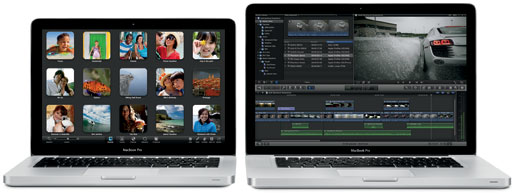Hosted by site sponsor WebMate.
Unibody MacBook Pro Q&A
Update Published December 20, 2022
All Mac Q&As >> Unibody MacBook Pro Q&A | Also See: All MacBook Pro Specs
To be notified of new Q&As, sign up for EveryMac.com's bimonthly email list.
What version of Mac OS X is pre-installed on the "Unibody" MacBook Pro models? What is the last version of Mac OS X supported by each model?
The precise version and even build number for Mac OS X originally pre-installed on each "Unibody" MacBook Pro is provided on the specs page for each model.

Photo Credit: Apple, Inc.
However, the basic version of each series also is provided below for your convenience:
| MacBook Pro | Original Mac OS X | Maximum Mac OS X |
| "Late 2008" | OS X 10.5.5 "Leopard" | OS X 10.11.6 "El Capitan" |
| "Early 2009" | OS X 10.5.6 "Leopard" | OS X 10.11.6 "El Capitan" |
| "Mid-2009" | OS X 10.5.7 "Leopard" | OS X 10.11.6 "El Capitan" |
| "Mid-2010" | OS X 10.6.3 "Snow Leopard" | macOS 10.13.x "High Sierra" |
| "Early 2011" | OS X 10.6.6 "Snow Leopard" | macOS 10.13.x "High Sierra" |
| "Late 2011" | OS X 10.7.2 "Lion" | macOS 10.13.x "High Sierra" |
| "Mid-2012" | OS X 10.7.3 "Lion" | macOS 10.15.x "Catalina" |
Versions of the operating system earlier than the one that shipped with a particular Mac are not compatible. None of these Macs support the current version of the macOS, either.
MacBook Pro models running Mac OS X 10.5 "Leopard" or Mac OS X 10.6 "Snow Leopard" are capable of running essentially all Mac software written for Intel-based Macs and the vast majority of Mac OS X applications written for PowerPC-based systems using the "Rosetta Universal Binary Translator".
MacBook Pro models running Mac OS X 10.7 "Lion" or Mac OS X 10.8 "Mountain Lion" -- whether pre-installed or otherwise -- are not capable of running Mac OS X applications written for the PowerPC processor as these versions of the operating system do not support Rosetta.
For the maximum supported version of Mac OS X for all "recent" -- G3 and later -- Macs, please refer to the Maximum Supported Mac OS listing.
Can the "Unibody" MacBook Pro run Mac OS 9/Classic applications?
No. Apple provides no support for running Mac OS 9 or the "Classic Environment" on Intel-based Macs like the "Unibody" MacBook Pro models. All "Unibody" MacBook Pro models shipped with Mac OS X 10.5 "Leopard" or later which provides no support for "Mac OS 9/Classic" applications.
If you have a mission critical application that only runs on Mac OS 9, you likely would be best served by maintaining a PowerPC-based Mac. However, you may also be interested in reading "Are there any third-party programs to run Mac OS 9/Classic applications on Intel Macs?" from the Mac OS 9/Classic Support Q&A.
Can the "Unibody" MacBook Pro run Windows?
Yes. For those who need to use Windows, the Windows on Mac Q&A provides answers for just about everything you need to know about running Windows on the "Unibody" MacBook Pro or any other Intel-based Mac.
Can the "Unibody" MacBook Pro run Linux?
Yes. All Intel-based Macs are capable of running a number of Intel-based distributions of Linux through Apple Boot Camp or by using "virtualization".
For more on Boot Camp and Virtualization, please refer to the Windows on Mac Q&A.
Permalink | Report an Error/Typo | Sign Up for Site Update Notices
<< Unibody MacBook Pro Q&A (Main) | Also See: All MacBook Pro Specs
Established in 1996, EveryMac.com has been created by experts with decades of experience with Apple hardware. EveryMac.com includes, and always has included, original research incorporating detailed, hands-on inspection of packaging, computers, and devices as well as extensive real-world use. All information is provided in good faith, but no website or person is perfect. Accordingly, EveryMac.com is provided "as is" without warranty of any kind whatsoever. EveryMac.com, and the authors thereof, shall not be held responsible or liable, under any circumstances, for any damages resulting from the use or inability to use the information within. For complete disclaimer and copyright information please read and understand the Terms of Use and the Privacy Policy before using EveryMac.com. Copying, scraping, or use of any content without expressed permission is not allowed, although links to any page are welcomed and appreciated.
